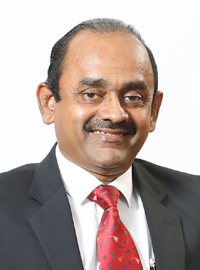Treasury takes over CPC’s debt owed to People’s Bank
View(s):
Mr. Sujeewa Rajapakse
The Treasury has taken over the Ceylon Petroleum Corporation (CPC)’s debt owed to the People’s Bank (PB) which runs into billions of rupees or foreign currency, according to PB Chairman Sujeewa Rajapakse.
“That is a huge burden taken off our shoulders. In future the Treasury will look after CPC’s liabilities to our bank,” he said in a wide-ranging interview this week dealing with challenges this year to the banking sector which are largely management of non-performing loans (NPL) and the impact of the high interest rates on borrowers.
He said the bank has stopped lending to SriLankan Airlines but that institution is also settling its loans.
Mr. Rajapakse said the banking sector is highly vulnerable to the current local and global crisis. “We are forever in the VUCA world – volatility, uncertainty, complexity and ambiguity,” he noted adding that with high deposit interest rates increasing the lending rates has led to many customers unable to service their debt.
“When customers say they cannot pay the loan, then the NPL goes up and we have to manage that situation. In any bank there are 2-3 important facts – liquidity (need cash in hand), then foreign currency required for international transactions particularly for CPC and Ceylon Electricity Board, pharmaceuticals, gas, coal,” he said, adding: “If you have a weak bottom line, you cannot strengthen your capital adequacy.”
Unlike private banks, the PB’s main concern is not profitability as its main shareholder is the Treasury and the bank meets the needs of society and the people. “We don’t have pressure to record profits but by way of providing facilities to society, we have done our part in community development,” he said.
While the bank has been able to maintain NPLs at required levels, there is a bigger challenge this year due to high taxes and interest rates and lower disposable incomes.
“With high interest rates, everyone runs to the bank and withdraws the money at earlier lower interest rates and re-deposits at higher rates. This is happening at a rate. However customers don’t want interest rates of loans touched and maintained at earlier rates. However the situation now is that without re-pricing our loan portfolio, it is unsustainable,” he said.
He said they were yet to see the impact from the new tax regime. “In this situation we look at the customer’s point of view what kind of comfort we can give our customers. We may have to restructure many loans giving more time to repay,” he said.
The PB last year opened LCs for the CPC running into billions of dollars which private banks don’t do. “Opening LCs and providing facilities to state-owned enterprises have been a challenge for which we have guarantees from the Treasury. In the past few years we have contributed more than Rs. 40 billion to the Treasury by way of taxes and dividends,” he said noting that while successfully securing foreign currency loans – owing to relationships with 900 international banks, the PB has never defaulted a single dollar of foreign debt.
The Central Bank has been helping with dollars but at one point they too said they didn’t have cash. “This was the time we had tough negotiations with foreign banks for credit lines. We came to an understanding that we would make payments on a staggered basis and this was accepted. We have repaid most of the banks now and are in a comfortable position,” he said adding that the banking sector expects a substantial improvement in foreign remittances.
Things are not rosy in the global scenario. Global leaders are predicting a tough year in 2023, he said. “One of the major challenges in the banking sector this year is liquidity, foreign currency is an issue and NPLs will rise. CEOs will be confronted with liquidity issues and forced to focus on operations which they don’t normally do. While lending has come down due to high interest rates, bankers are also vigilant when lending to ensure no risks are involved in lending. There is more scrutiny now for lending,” he added.
Hitad.lk has you covered with quality used or brand new cars for sale that are budget friendly yet reliable! Now is the time to sell your old ride for something more attractive to today's modern automotive market demands. Browse through our selection of affordable options now on Hitad.lk before deciding on what will work best for you!


